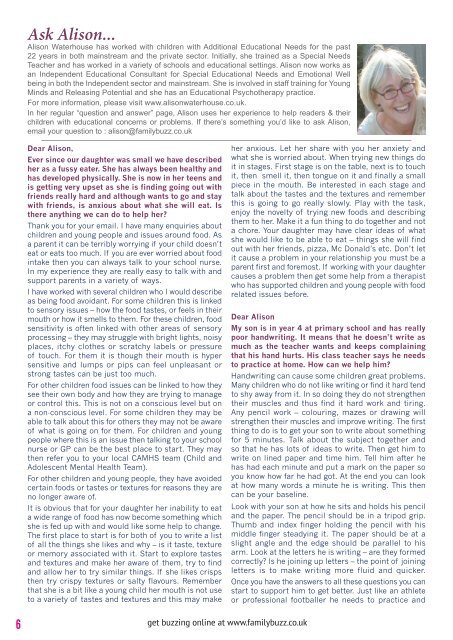Family Buzz Winter 2016/17
Family Buzz Winter 2016-17
Family Buzz Winter 2016-17
Create successful ePaper yourself
Turn your PDF publications into a flip-book with our unique Google optimized e-Paper software.
Ask Alison...<br />
Alison Waterhouse has worked with children with Additional Educational Needs for the past<br />
22 years in both mainstream and the private sector. Initially, she trained as a Special Needs<br />
Teacher and has worked in a variety of schools and educational settings. Alison now works as<br />
an Independent Educational Consultant for Special Educational Needs and Emotional Well<br />
being in both the Independent sector and mainstream. She is involved in staff training for Young<br />
Minds and Releasing Potential and she has an Educational Psychotherapy practice.<br />
For more information, please visit www.alisonwaterhouse.co.uk.<br />
In her regular “question and answer” page, Alison uses her experience to help readers & their<br />
children with educational concerns or problems. If there’s something you’d like to ask Alison,<br />
email your question to : alison@familybuzz.co.uk<br />
Dear Alison,<br />
Ever since our daughter was small we have described<br />
her as a fussy eater. She has always been healthy and<br />
has developed physically. She is now in her teens and<br />
is getting very upset as she is finding going out with<br />
friends really hard and although wants to go and stay<br />
with friends, is anxious about what she will eat. Is<br />
there anything we can do to help her?<br />
Thank you for your email. I have many enquiries about<br />
children and young people and issues around food. As<br />
a parent it can be terribly worrying if your child doesn’t<br />
eat or eats too much. If you are ever worried about food<br />
intake then you can always talk to your school nurse.<br />
In my experience they are really easy to talk with and<br />
support parents in a variety of ways.<br />
I have worked with several children who I would describe<br />
as being food avoidant. For some children this is linked<br />
to sensory issues – how the food tastes, or feels in their<br />
mouth or how it smells to them. For these children, food<br />
sensitivity is often linked with other areas of sensory<br />
processing – they may struggle with bright lights, noisy<br />
places, itchy clothes or scratchy labels or pressure<br />
of touch. For them it is though their mouth is hyper<br />
sensitive and lumps or pips can feel unpleasant or<br />
strong tastes can be just too much.<br />
For other children food issues can be linked to how they<br />
see their own body and how they are trying to manage<br />
or control this. This is not on a conscious level but on<br />
a non-conscious level. For some children they may be<br />
able to talk about this for others they may not be aware<br />
of what is going on for them. For children and young<br />
people where this is an issue then talking to your school<br />
nurse or GP can be the best place to start. They may<br />
then refer you to your local CAMHS team (Child and<br />
Adolescent Mental Health Team).<br />
For other children and young people, they have avoided<br />
certain foods or tastes or textures for reasons they are<br />
no longer aware of.<br />
It is obvious that for your daughter her inability to eat<br />
a wide range of food has now become something which<br />
she is fed up with and would like some help to change.<br />
The first place to start is for both of you to write a list<br />
of all the things she likes and why – is it taste, texture<br />
or memory associated with it. Start to explore tastes<br />
and textures and make her aware of them, try to find<br />
and allow her to try similar things. If she likes crisps<br />
then try crispy textures or salty flavours. Remember<br />
that she is a bit like a young child her mouth is not use<br />
to a variety of tastes and textures and this may make<br />
her anxious. Let her share with you her anxiety and<br />
what she is worried about. When trying new things do<br />
it in stages. First stage is on the table, next is to touch<br />
it, then smell it, then tongue on it and finally a small<br />
piece in the mouth. Be interested in each stage and<br />
talk about the tastes and the textures and remember<br />
this is going to go really slowly. Play with the task,<br />
enjoy the novelty of trying new foods and describing<br />
them to her. Make it a fun thing to do together and not<br />
a chore. Your daughter may have clear ideas of what<br />
she would like to be able to eat – things she will find<br />
out with her friends, pizza, Mc Donald’s etc. Don’t let<br />
it cause a problem in your relationship you must be a<br />
parent first and foremost. If working with your daughter<br />
causes a problem then get some help from a therapist<br />
who has supported children and young people with food<br />
related issues before.<br />
Dear Alison<br />
My son is in year 4 at primary school and has really<br />
poor handwriting. It means that he doesn’t write as<br />
much as the teacher wants and keeps complaining<br />
that his hand hurts. His class teacher says he needs<br />
to practice at home. How can we help him?<br />
Handwriting can cause some children great problems.<br />
Many children who do not like writing or find it hard tend<br />
to shy away from it. In so doing they do not strengthen<br />
their muscles and thus find it hard work and tiring.<br />
Any pencil work – colouring, mazes or drawing will<br />
strengthen their muscles and improve writing. The first<br />
thing to do is to get your son to write about something<br />
for 5 minutes. Talk about the subject together and<br />
so that he has lots of ideas to write. Then get him to<br />
write on lined paper and time him. Tell him after he<br />
has had each minute and put a mark on the paper so<br />
you know how far he had got. At the end you can look<br />
at how many words a minute he is writing. This then<br />
can be your baseline.<br />
Look with your son at how he sits and holds his pencil<br />
and the paper. The pencil should be in a tripod grip.<br />
Thumb and index finger holding the pencil with his<br />
middle finger steadying it. The paper should be at a<br />
slight angle and the edge should be parallel to his<br />
arm. Look at the letters he is writing – are they formed<br />
correctly? Is he joining up letters – the point of joining<br />
letters is to make writing more fluid and quicker.<br />
Once you have the answers to all these questions you can<br />
start to support him to get better. Just like an athlete<br />
or professional footballer he needs to practice and<br />
6<br />
get buzzing online at www.familybuzz.co.uk

















